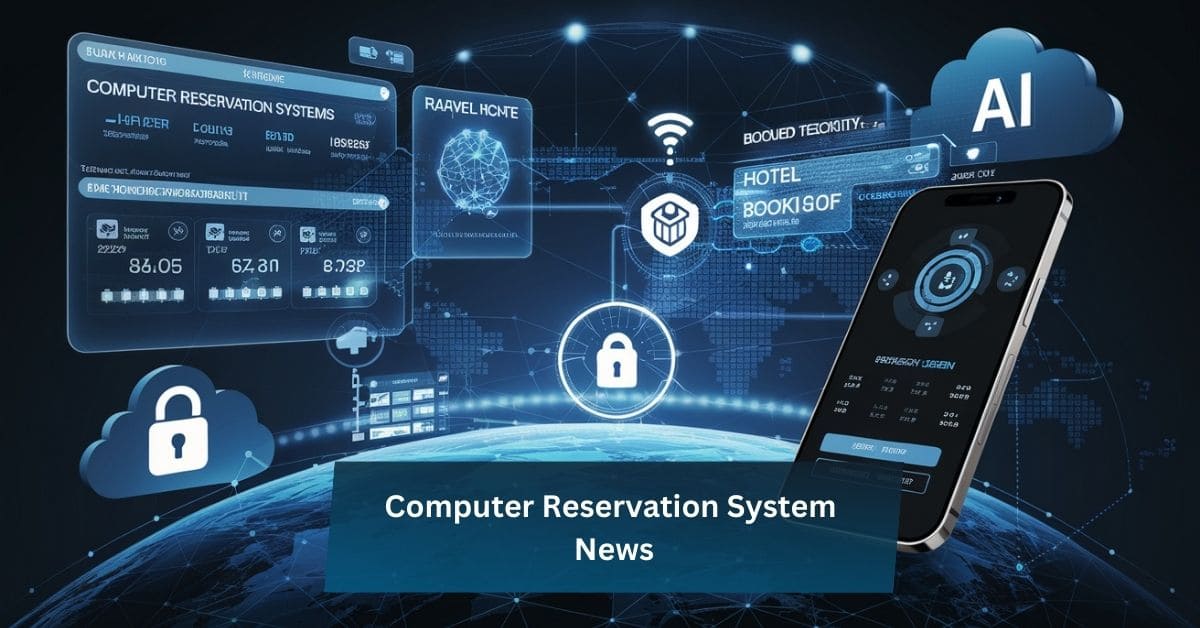I recently started exploring how computer reservation systems work, and it amazed me how quickly they process bookings for flights and hotels. Using one, I realized how AI-powered features like personalized suggestions make planning trips much easier. For me, staying updated on CRS trends has been super helpful in understanding the future of travel technology.
Stay updated on the latest in computer reservation systems, including AI-powered personalization, cloud-based platforms, and enhanced data security. These advancements make travel bookings faster, safer, and more user-friendly. Follow CRS news to see how technology is transforming the travel experience.
What Is A Computer Reservation System (CRS)?
Software for managing reservations for travel, lodging, rental cars, and other services is called a Computer Reservation System (CRS). It accepts payments, changes availability, and gathers current information from vendors. CRSs, which were first developed for airlines, are now utilized by the whole travel sector and facilitate quicker and simpler reservation processing for both clients and travel agencies.
1. How Computer Reservation System (Crs) Works?
- Collecting Data: CRS gathers information from travel suppliers like airlines, hotels, and car rental companies.
- Real-Time Updates: It continuously updates data to ensure accuracy and current availability.
- Booking and Reservations: Customers or agents can search for services (flights, hotels, etc.), select options, and make bookings.
- Inventory and Pricing Management: CRS manages availability and adjusts pricing based on demand, seasonality, and other factors.
- Payment Processing: After a reservation, the system processes payments securely, either directly or through third-party payment gateways.
Importance Of Staying Updated On Crs News

- Improves Efficiency: New updates in CRS technology, like AI and cloud systems, make booking and managing reservations faster and easier.
- Enhances Customer Experience: CRS updates often include features like personalized recommendations, live pricing, and better design, making the booking process smoother and more enjoyable for customers.
- Keeps Businesses Competitive: The travel industry is always changing. By keeping up with CRS trends, businesses can use the latest technologies and stay ahead of their competitors.
- Better Decision Making: CRS news helps businesses learn about new technologies, rule changes, and market shifts, helping them make better choices for their operations.
- Improved Security: Since CRSs handle important customer information, staying updated on security news helps businesses protect data from breaches and online threats.
Latest Trends In Computer Reservation System News
1. Cloud-Based Crss
Cloud technology is reshaping CRSs, offering scalability and flexibility.
- Handles large volumes of bookings without heavy infrastructure.
- Reduces operational costs.
- Enables seamless integration with other platforms.
2. Ai And Machine Learning
Artificial Intelligence (AI) is transforming how CRSs operate:
- Predictive Analytics: Anticipates customer needs and adjusts pricing.
- Chatbots: Provides instant support and personalized booking assistance.
- Dynamic Pricing: Prices vary in response to market conditions and demand.
3. Enhanced Data Security
With increasing cyber threats, CRS providers are investing in advanced security measures:
- Encryption to protect sensitive data.
- Multi-factor authentication for secure access.
- Compliance with global privacy regulations like GDPR.
4. Mobile Optimization
Mobile-first strategies are gaining traction:
- Responsive designs for a smooth booking experience.
- Dedicated apps for managing reservations on the go.
- Faster booking processes for last-minute travelers.
Read Also: Hamster Kombat – The Ultimate Guide To This New Virtual Adventure!
Technological Advancements In Crss
1. Real-Time Pricing And Inventory Management
Real-Time Pricing and Inventory Management are key features of modern CRS, enabling travel companies to dynamically adjust prices and availability:

- Dynamic Pricing: Using AI-driven algorithms, prices are adjusted in real-time based on demand, supply, and market conditions (e.g., higher prices during peak times).
- Inventory Updates: CRS instantly updates availability, ensuring accurate information and preventing overbooking by tracking bookings across various channels.
- Revenue Management: Real-time data helps optimize pricing strategies, like raising prices closer to flight departure or adjusting hotel rates to maximize revenue.
- Competitive Advantage: Travel companies can quickly respond to market changes, ensuring they remain competitive by adjusting prices instantly.
- Cost Efficiency: Automation reduces manual tasks, improving efficiency and profitability by matching prices with demand.
2. Blockchain Integration
Blockchain integration in CRS improves travel booking efficiency, security, and transparency:
- Improved Security: Blockchain encrypts data, protecting customer information and reducing fraud risks.
- Transparency: It creates a clear, unchangeable record of transactions, building trust between customers and service providers.
- Faster Payments: By removing middlemen, blockchain speeds up payment processing and settlements.
- Smart Contracts: Blockchain uses smart contracts to automatically execute booking terms, making transactions smoother.
- Cost Savings: Eliminating intermediaries reduces fees, lowering booking costs for both customers and businesses.
3. Sustainability Features
Sustainability Features in CRS help reduce the environmental impact of travel:
- Eco-Friendly Options: CRS highlights low-carbon flights and eco-friendly hotels.
- Carbon Footprint Tracking: Travelers can see the emissions of their travel choices.
- Green Certifications: CRS showcases certified sustainable businesses.
- Incentives for Sustainable Travel: Some platforms offer rewards for eco-friendly bookings.
- Waste Reduction: Digital tickets and mobile check-ins reduce paper waste.
Benefits Of Modern Computer Reservation Systems
Modern Computer Reservation Systems (CRS) offer numerous advantages to both businesses and customers in the travel industry. Here are some key benefits:
- Efficiency and Speed: Modern CRS automate booking processes, making reservations quicker and more accurate. This helps reduce human error and improves overall efficiency.
- Real-Time Updates: CRS provide up-to-date information on availability, prices, and bookings, ensuring customers always have the latest details.
- Cost Savings: By streamlining operations, CRS reduce the need for manual labor and third-party intermediaries, lowering operational costs for businesses.
- Improved Customer Experience: With features like personalized recommendations, easy-to-use interfaces, and faster booking, customers enjoy a smoother and more satisfying travel planning experience.
- Integration with Other Systems: Modern CRS integrate seamlessly with other platforms, such as Global Distribution Systems (GDS), allowing businesses to manage inventory, pricing, and bookings from multiple sources in one place.
- Better Revenue Management: Dynamic pricing tools within CRS allow companies to adjust prices based on real-time demand, helping maximize revenue.
- Security: Advanced security features protect sensitive customer data, reducing the risk of breaches and ensuring trust.
Read Also: Преводеч – A Comprehensive Guide!
Challenges In Computer Reservation System (Crs) Adoption
While Computer Reservation Systems (CRS) offer many benefits, there are several challenges that businesses face when adopting and integrating them:

- High Initial Costs: Implementing a CRS can be expensive due to setup, integration, and training costs. This can be especially challenging for small businesses with limited budgets.
- Complex Integration: CRS often need to be integrated with existing systems, which can be complicated and time-consuming, requiring technical expertise.
- Legacy Systems: Many companies are still using outdated CRS, and upgrading to newer systems can be costly, disruptive, and require a significant investment in both time and resources.
- Data Privacy and Compliance: Since CRS handle sensitive customer data, businesses must ensure their systems comply with privacy regulations like GDPR, which can add complexity and cost.
- Dependence on Internet Connectivity: Cloud-based CRS rely on stable internet connections, and disruptions in service can negatively impact operations, especially in areas with poor connectivity.
- Resistance to Change: Employees or businesses that are used to older methods may resist adopting new CRS technologies, slowing down the implementation process.
The Future Of Computer Reservation Systems
1. Ai And Automation
AI and Automation enhance Computer Reservation Systems (CRS) by personalizing recommendations, automating bookings and support, and adjusting prices in real-time. They streamline tasks, reduce errors, and improve efficiency, making CRS faster and more customer-friendly.
2. Augmented Reality (Ar)
Augmented Reality (AR) in CRS lets travelers explore destinations, hotel rooms, or airplane cabins virtually before booking. This helps customers make better decisions by seeing their options in 3D, improving their overall booking experience and satisfaction.
3. Blockchain Expansion

Blockchain is being used more in Computer Reservation Systems (CRS) to make bookings safer and more transparent. It helps prevent fraud by creating secure, unchangeable records of transactions. Blockchain also speeds up payments and improves data privacy, making the entire booking process more secure for everyone.
FAQ’s
1. What Is The Latest In Computer Reservation Systems?
The latest CRS updates include AI-driven personalization, cloud-based infrastructure, and enhanced security measures to improve booking efficiency.
2. Why Are Crss Important In Travel?
CRSs simplify booking processes, provide real-time updates, and enhance the customer experience, making them essential for travel businesses.
3. What Are Some Key Players In The Crs Market?
Key players in the CRS market include Amadeus for booking and inventory, Sabre for real-time bookings, Travelport for multi-service booking, Navitaire for low-cost carriers, and Oracle Hospitality for hotel CRS solutions. They lead the way in enhancing travel services.
4. How Does Ai Impact Crss?
AI optimizes CRS operations by enabling predictive analytics, dynamic pricing, and personalized customer interactions.
5. What Challenges Do Crss Face?
High costs, reliance on outdated systems, and evolving data privacy regulations are common challenges.
Conclusion
Computer Reservation Systems are the driving force behind modern travel bookings, enabling businesses to operate efficiently while enhancing customer satisfaction. Staying updated on CRS news is essential for understanding how advancements like AI, cloud technology, and blockchain are shaping the future of travel. By embracing these innovations, businesses can stay competitive and deliver seamless booking experiences.
Read More:















Leave a Reply